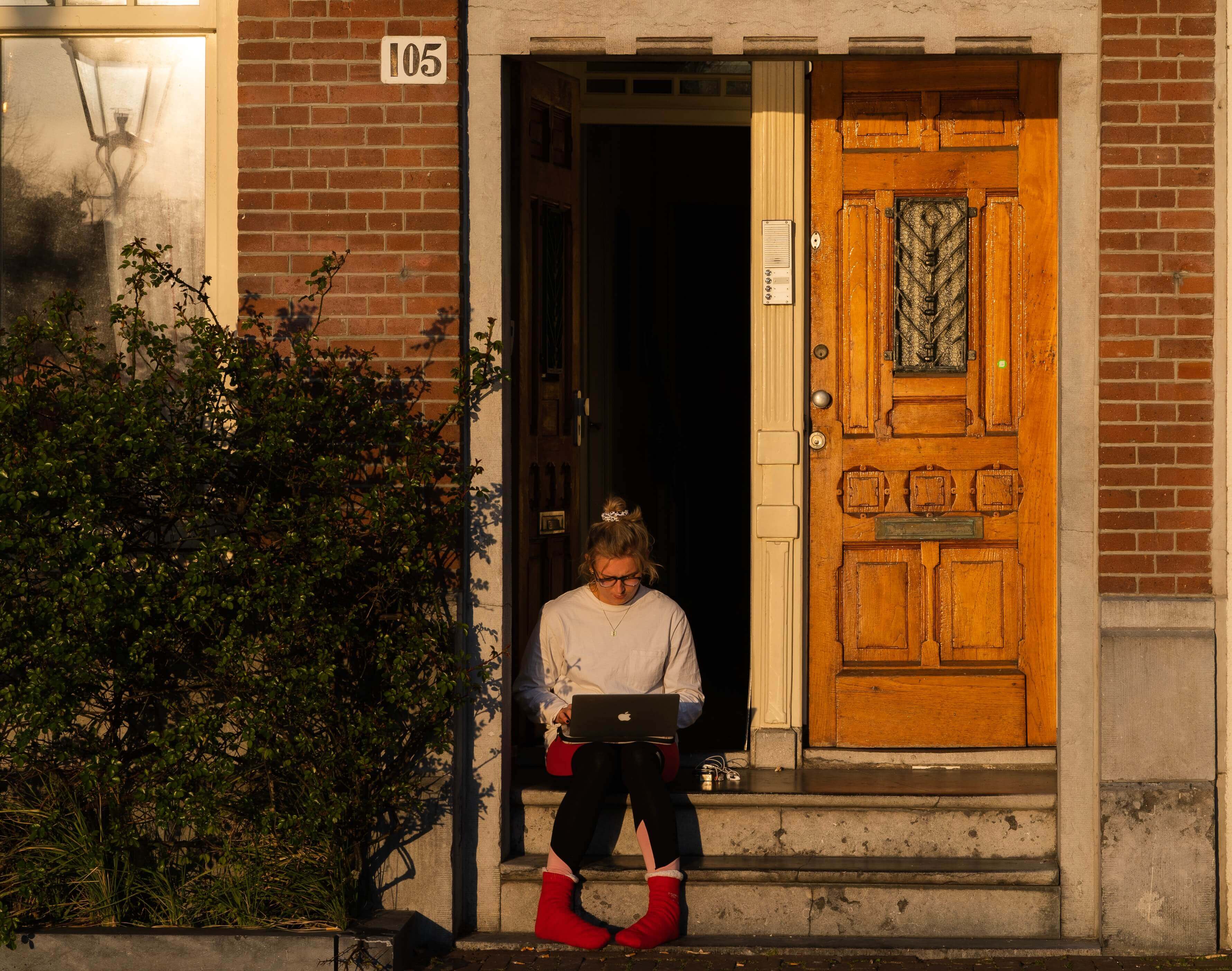
Inhaltsverzeichnis
Home Office: Tipps für die Arbeit von Zuhause aus
Zwar haben seit letzter Woche wieder einige Geschäfte geöffnet, doch für viele von uns ändert sich an der derzeitigen Situation weiterhin nicht viel. Die Corona-Pandemie ist allgegenwärtig und so langsam strapaziert die Zeit in der Quarantäne immer mehr unsere Nerven. Während sich die Zeit Zuhause anfangs noch wie Urlaub anfühlte, wird es mitterweile Tag für Tag anstrengender und energieraubender. Das wirkt sich natürlich auch auf unsere Motivation und somit auch auf die Effektivität unserer Arbeit im Home-Office aus.
Seit über einem Jahr arbeite ich nun von Zuhause aus (und von meinen Lieblings-Cafés aus – aber das ist momentan ja auch nicht drin) und habe mich daher schon mehrmals mit der Thematik befasst. Die Tipps und Tricks, die mir immer wieder dabei helfen, motiviert von Zuhause aus zu arbeiten, möchte ich heute mit dir teilen. Hoffentlich helfen dir ein paar dieser Anregungen!
Home Office Tipps für produktives Arbeiten von Zuhause aus
1. Genug Schlaf & limitierte Handy-Zeit am Morgen
Produktive Arbeit fängt mit unserem Schlaf an. Denn wenn wir nicht lang oder ruhig genug schlafen können, wirkt sich das auf mitunter auf unser Energielevel aus. Dann kann es schnell passieren, dass wir mehrmals auf “Snooze” drücken, uns noch einmal umdrehen oder das Handy zücken, “um aufzuwachen”... An dieser Ausrede (ich bekenne mich übrigens auch schuldig) mag vielleicht insofern etwas dran sein, als dass das grelle Licht unseres Bildschirms und die Benachrichtigungen, die nur so auf uns einprasseln, uns wirklich dabei helfen, wach zu werden. Aber sinnvoll ist das gewiss nicht.
Deswegen habe ich mir angewöhnt, abends den Flugmodus einzuschalten und ihn erst nach meinem Morgenritual (siehe Tipp Nummer 2) auszuschalten. Alternativ kannst du in den Einstellungen deines Handys einstellen, ab wann du welche Apps verwenden “darfst”. So habe ich beispielsweise zusätzlich eingestellt, dass Youtube und Instagram für mich vor neun Uhr morgens “gesperrt” sind. Noch besser wäre es natürlich, das Handy über Nacht in einem anderen Raum zu lassen und einen handelsüblichen Wecker zu verwenden.
2. Dein eigenes, kleines Morgenritual
Es kann eine unheimlich motivierende und energetische Wirkung haben, wenn wir uns morgens ein wenig Zeit nur für uns selbst nehmen. Das mögen 5, 10 oder 30 Minuten sein – was immer die passt. Ob du dir in Ruhe einen Kaffee kochst, einen kurzen Morgenspaziergang machst, dir ein leckeres Frühstück zubereitest, ein Kapitel in einem Buch liest, mit dem Hund an die frische Luft gehst, Tagebuch schreibst, meditierst, Sport machst... – das bleibt natürlich dir überlassen. Am besten suchst du dir zwei bis drei Aktivitäten aus, die du zeitlich schaffen kannst und die nicht allzu aufwändig sind. Außerdem ist es natürlich wichtig, dass du Spaß an diesen Aktivitäten hast und sie nicht machst, weil du das Gefühl hast, du “musst” sie machen.
Für mich gehört zu meinem Morgenritual, frische Luft in mein Schlafzimmer zu lassen, mein Bett zu machen, ein großes Glas Wasser zu trinken und dann anschließend etwa zehn bis fünfzehn Minuten lang zu meditieren.
Schon beim Zubettgehen zu wissen, wie der morgige Start in den Tag aussehen wird, gibt mir ein gutes Gefühl und ich freue mich auf die Zeit für mich sowie auf den anschließenden Tag. Ich musste ein bisschen herumprobieren, bis ich die Routine gefunden habe, die sich für mich nun am besten anfühlt. Aber seitdem ich mir die knappe halbe Stunde am Morgen gönne, fühle ich mich viel motivierter und ausgeglichener!
3. Mach’ dich fertig!
Das meine ich natürlich im Sinne von “sich zurechtmachen”. In meinem Kopf macht es einen großen Unterschied, ob ich im Pyjama bzw. Schlabberlook am Schreibtisch sitze oder mir ein “richtiges” Outfit anziehe. Da ich immerhin die meiste Zeit des Tages im Sitzen verbringe, muss besagtes Outfit natürlich immer noch gemütlich sein (die paigh-Hosen eignen sich beispielsweise mega gut), aber es sollte eben keines meiner “ich-chille-mit-Jogginghose-auf-der-Couch”-Kombinationen sein. Falls du gerne Make Up trägst, kann auch das dabei helfen, dass du dich “bereit” für die Arbeit fühlst. Eben so, wie du es machen würdest, wenn du nicht von Zuhause aus Arbeiten würdest.

Photo by Charles Deluvio on Unsplash
4. Der Arbeitsplatz
Ein geeigneter Arbeitsplatz kann eine ganze Menge ausmachen. Leider ist dies auch einer der Punkte, die unter Umständen am schwierigsten umzusetzen sind. Nicht jeder hat den Platz für ein eigenes Arbeitszimmer oder eine ungestörte Arbeitsatmosphäre. Dennoch lässt sich das Arbeiten von Zuhause aus mit ein paar Tricks angenehmer gestalten.
- Die wichtigste Regel ist, sich einen festen Arbeitsplatz zu erschaffen. Im besten Falle ist dieser weit weg von Bett oder Couch. Denn eine räumliche Trennung von Schlafen/Entspannen/Arbeiten hilft unserem Gehirn dabei, auch eine mentale Trennung dieser Aktivitäten zu verinnerlichen.
- Wenn du deinen Schreibtisch so platzieren kannst, dass er abgewendet von Kleiderbergen, schmutzigem Geschirr oder anderer Unordnung steht, dann trägt auch das zu deiner Produktivität bei. Sind wir umgeben von Chaos und Unordnung, können wir uns nicht so gut auf eine Sache konzentrieren und sind beispielsweise gedanklich schon dabei, zu planen, wann die nächste Wäsche aufgesetzt werden muss. Mir persönlich gefällt es am besten, wenn mein Schreibtisch vor meinem Fenster steht, da ich so auch die Möglichkeit habe, ein paar Sonnenstrahlen ab zu bekommen.
- Ebenfalls wichtig ist, den Arbeitsplatz selbst so sauber wie möglich zu halten. Räume regelmäßig Papiere, Stifte und Ordner weg, die du nicht benötigst. Auch wenn du deinen Arbeitsplatz an einem Ort aufbaust, der sonst für etwas anderes genutzt wird (Esstisch / Nachttisch / Couchtisch) ist es sinnvoll, diesen Platz so gut es geht frei zu räumen, damit du dich ganz aufs Arbeiten konzentrieren kannst.
- Nicht nur der eigene Schreibtisch sollte aufgeräumt sein, sondern auch der Desktop. Denn der gehört schließlich zu unserem Arbeitsplatz dazu. Mein Gehirn fühlt sich entspannter und leerer an, wenn ich möglichst wenige Fenster und Tabs geöffnet habe sowie wenn ich die Symbole auf meinen Desktop reduziert bzw. ordentlich angeordnet habe. Klingt überflüssig pingelig, macht aber einen Unterschied!
5. Die Power von Listen
Wer mich kennt, weiß, dass ich ein großer Fan von To-Do-Listen bin. Auch die helfen dabei, den Kopf frei zu bekommen und man verpasst sich jedes Mal aufs Neue einen kleinen Dopamin-Kick, wenn man etwas abhaken kann.
Es hilft, die Punkte auf der Liste zu priorisieren. Schreibe am besten zunächst einmal alles auf, was dir in den Kopf kommt. Dann kannst du die zwei bis drei wichtigsten Punkte auf deiner Liste markieren.
Auch gut ist, wenn du aufwändige Listenpunkte (z.B. “Projekt fertigstellen”) in viele kleine Schritte herunter brichst (z.B. “Recherche” / “Stichpunkte machen” / “x eine E-Mail schreiben” / “Stichpunkte in Text umwandeln” / “Text finalisieren” / “Bilder heraussuchen” / “Präsentation erstellen” / “pdf erstellen” …). Das gibt dir die Möglichkeit, mehrere Dinge über den Tag hinweg abzuhaken und verbildlicht dir am Ende des Tages das, was du geschafft hast.
Photo by Charles Deluvio on Unsplash
6. Ablenkungen minimieren
Ablenkungen durch Kinder, den Partner / die Partnerin oder sonstige Mitbewohner*innen sind nicht immer vermeidbar. Dennoch kann man mögliche andere Ablenkungen minimieren. Das kann geschehen, indem man Benachrichtigungen ausschaltet (nicht nur am Handy, sondern beispielsweise auch E-Mail-Benachrichtigungen am Laptop), das Handy möglichst weit weg legt oder sich selbst Regeln setzt. Eine meiner Regeln lautet beispielsweise: “Am Schreibtisch werden keine Whatsapp-Nachrichten gecheckt”. Damit kreiere ich eine mentale Assoziation, dass Schreibtisch (= Arbeit) und Whatsapp (= Vergnügen) nicht zusammen gehören. Wenn diese Regel für dich nicht umsetzbar ist, weil du über Whatsapp mit Kolleg*innen etc. kommunizieren musst, dann findest du vielleicht eine andere Regel, die denselben Zweck erfüllt.
7. Pausen sind ebenso wichtig wie Arbeitsphasen
Pausen zu machen ist wohl einer der wichtigsten Punkte überhaupt. Unser Gehirn kann nicht drei Stunden am Stück höchstkonzentriert arbeiten und das dürfen wir auch gar nicht verlangen. Nimm dir also regelmäßig Zeit für kleine Pausen, in denen du dich bewusst NICHT mit arbeitsrelevanten Inhalten beschäftigst. Ein erholsamer Effekt kann nur eintreten, wenn unser Kopf richtig abschalten kann. Du kannst dir zum Beispiel erlauben, in Pausen deine sozialen Medien zu checken, du kannst ein unterhaltsames Video schauen, etwas snacken oder eine Runde um den Block gehen.
Physische Aktivitäten helfen mir besonders während dem bekannten Motivationstief am Nachmittag. Nach dem Mittagessen versacke ich gerne auf der Couch mit dem Smartphone in der Hand und so wird aus der geplanten halben Stunde Pause schnell mal eine ganze Stunde. Daher versuche ich, wenn ich merke, dass das Nachmittagstief einsetzt, etwas körperliches zu machen. So lässt sich das Tief zu einer produktiven Pause umfunktionieren. Zum Beispiel räume ich auf, staubsauge, spüle das Geschirr ab oder mache einen kleinen Spaziergang. Auch mithilfe von Dehnübungen oder einer kleinen Tanz-Einlage zu meinem Lieblingssong schaffe ich es regelmäßig, das Motivationstief zu überwinden.
8. Pläne machen
In Zeiten, in denen man viel Zuhause ist und die Tage eher eintönig sind, ist es wichtig, sich bewusst Zeit für schöne Dinge zu nehmen. Auch wenn wir aktuell aufgrund der momentanen Lage nicht so viel unternehmen können wie sonst, gibt es dennoch einiges, was uns einen schönen Tagesabschluss bescheren kann. Zum Beispiel kannst du facetime-Dates mit Freunden vereinbaren, deinem Lieblingshobby nachgehen, dir Zeit nehmen, um ein Buch zu lesen, etwas schönes kochen oder Zeit mit deinen Liebsten verbringen (so sie denn in deinem Haushalt wohnen 😅). So hast du etwas, worauf du dich freuen kannst.
Du kannst dir außerdem eine Uhrzeit festsetzen, zu der du mit der Arbeit aufhören möchtest. Das klappt in meinem Falle mal besser und mal schlechter, aber es hilft mir, auch gedanklich einen Strich zu ziehen und den Arbeitstag zu beenden.
Zu guter Letzt möchte ich betonen, dass es wichtig ist, dass du nicht zu hart zu dir selbst bist. Es wird immer Tage geben, an denen es besser läuft als an anderen Tagen. Und da die aktuelle Situation schon belastend genug ist, ist es total verständlich, wenn du momentan Schwierigkeiten damit hast, motiviert zu bleiben. Damit bist du nicht allein. Wir können lediglich versuchen, unser Bestes zu geben sowie darauf vertrauen und hoffen, dass auch wieder bessere Zeiten kommen werden.
Pass auf dich auf! ❤️
Wenn du noch mehr über die Themen Achtsamkeit, gesunde Ernährung oder Nachhaltigkeit erfahren möchtest, schaue doch mal hier vorbei.
Photo by Fa Barboza on Unsplash





























Leave a comment
This site is protected by hCaptcha and the hCaptcha Privacy Policy and Terms of Service apply.